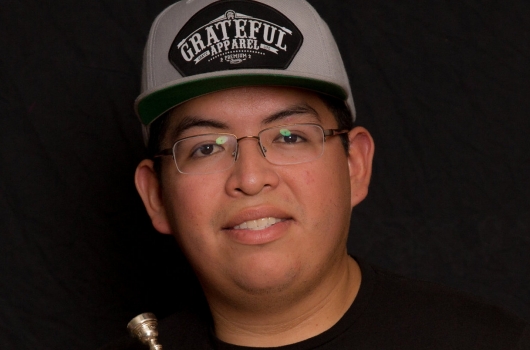Where Are They Now? Eliud Peralez
 2016-17 NBA XPLOR Resident Eliud Peralez
2016-17 NBA XPLOR Resident Eliud Peralez
In 2014, the National Benevolent Association(NBA) launched the NBA XPLOR Residency, a 10-month internship program for young adults. Centered upon spiritual and vocational discernment, the Residency offers 21- to 30-year-olds time and space to live in simple community and address social injustice. Residents serve with host congregations and community engagement sites, developing their leadership skills as Disciples.
Now in its fourth year, NBA XPLOR alumni are dedicating themselves to systemic justice work, as well as direct care and action, across the life of the church. We look forward to seeing where the call takes them!
In this story, XPLOR alum Eliud Peralez shares how his experience with the XPLOR Residency led him to become an Anti-Racism/Pro-Reconciliation (AR/PR) trainer.
1. What year was your XPLOR Residency and where did you serve?
From 2016 to 2017, I served at All Peoples Community Center and First Christian Church of North Hollywood (Disciples of Christ).
2. How did you hear of taking training to become an AR/PR trainer?
One of the cornerstones of the XPLOR program is social justice. After speaking to the Rev. Lori Tapia, the national pastor for the Central Pastoral Office for Hispanic Ministries, she recommended I become a trainer for the Reconciliation Ministry of the Christian Church (Disciples of Christ). She believed it would be a crucial part of my ministry within the general church.
3. When did you first get involved?
I was sent to Indianapolis, Indiana in February of this year to meet with a new cohort of trainers. After our initial training, we meet once a month for one hour to do telephone trainings and occasionally meet face to face in Indiana for weekend long trainings and seminars.
4. What made you decide to become a trainer yourself?
I’ve always felt a calling to become involved with the general church. I just didn’t know what that calling looked like. When I spoke to my National Hispanic Pastor, she let me know of this opportunity to become a voice for the voiceless. I knew exactly that’s where God wanted me to become strong in. I actually prayed really hard and shed many tears to get used to idea that racism is still a part of not only our church, but of our community, and I wanted to be a part of the solution and not the problem.
5. How did the NBA facilitate that process?
I will forever be eternally grateful for the opportunity that the NBA has given me to be a part of the AR/PR ministry through their sponsorship and mental health support. The NBA has been so generous to fund most of my trainings with flights, food, and accommodation. The NBA has played a key role in the success of my training.
6. How far along are you in your training? If you’re finished, what is it like being on the trainer side of things?
I’ve been in training for 11 months, but we’re never done training. April Johnson, Executive Director of Reconciliation Ministry, constantly has us training each other and receiving training. It is a never-ending process of training and giving training.
7. Would you recommend other XPLOR Residents to become trainers themselves? Why?
I would highly recommend others to get involved. That ministry is made to cause discomfort, but to also bring hope in the middle of this racist environment. It’s also very fun to get to work with amazing and passionate people who love the Lord and work to create communities of compassion and care.
8. If your training took place during your Residency, how did it impact the work you did at your community engagement site and host congregation, if at all?
First of all, communication is key. I had to make sure that my supervisors were OK with my missing several weeks for training, and my host congregation was very open to letting me attend. Ultimately, communicating with everyone made it easy to be a part of AR/PR and XPLOR.
9. How do you see it influencing future steps you will take in your career, faith, and community work?
I’ve become of aware of microaggressions, vocabulary, and my overall approach to the people around me. I know that wherever I find myself I am going to want to share my training and bring awareness to the groups I work with.
10. Why is AR/PR important in the life of local communities, the church, and the world?
If we can recognize that this world is fragmented, then we must also recognize the tools and behavior to bring healing and reconciliation to all types of people.
Printer-friendly version here! >>
NBA XPLOR is a 10-month service residency opportunity for young adults ages 21-30, with the purpose of empowering young adults to discern and develop a “heart for care” as they live together in simple community, engage in direct service and justice work, engage in leadership development, and discern their vocational calls to honor the various communities they are called to serve. Learn more and apply at nbacares.org/xplor.